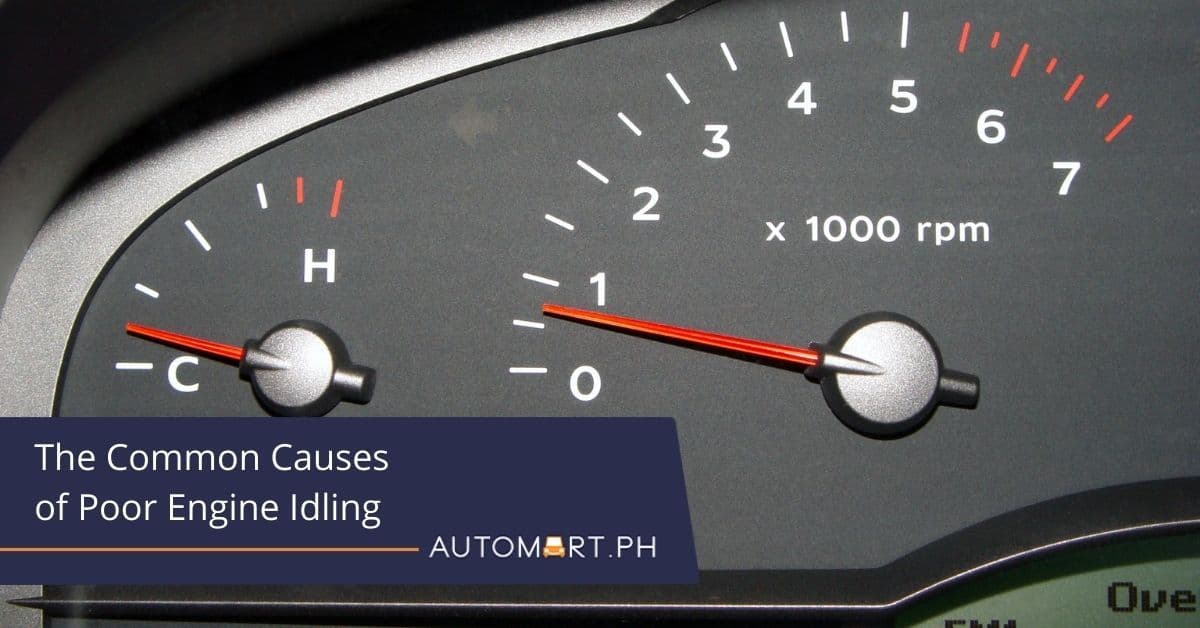
The Common Causes of Poor Engine Idling
Updated on February 22 2026
Your car’s engine should settle into a smooth idle after starting. You may notice the engine is idling higher than usual after cold starts, and that’s perfectly normal. But if you have symptoms of rough idling or if the engine is idling at varying RPMs (revolutions per minute) when the vehicle is at a standstill, consider checking under the hood or bringing your car to a mechanic promptly.
What is rough idling?
If the tachometer or rev counter in your car is rising, falling, sputtering, or is having difficulty maintaining a smooth engine rotation, that is what you call rough idling. Excessive engine vibrations and possibly thick, white smoke from the exhaust pipes will typically accompany the rough idling, leading to a stressful and unpleasant driving experience. In some cases, the rough idling could be so bad as to cause the engine to stall or die out.

A smooth idle is dependent on having the proper air and fuel mixture at any given moment. Even just a slight deviation may cause the engine to idle poorly.
How do I diagnose poor engine idling?
Modern vehicles have sophisticated computer networks to monitor the air, fuel, combustion, and exhaust systems. If anything goes wrong or the check engine light comes ON, you’ll need a modern scan tool to pinpoint the fault. Now, a rough idling engine may or may not trigger the check engine light. But if it does, the easiest way to diagnose the problem is to hook up the scan tool and read the error code.
My carburetor engine is idling poorly. What could be the problem?
If you have an older vehicle with a carbureted engine, cleaning out the carburetor and removing carbon deposits may cure a rough idle. You should also check the vacuum hoses for leaks or check the distributor cap and the rotor of the ignition system.
The Common Causes of Poor Engine Idling
1. Dirty, faulty, or fouled-up spark plugs.
Let’s start with the basics. If your engine has a rough idle, the first things to check are the spark plugs. Dirty, faulty, or failing spark plugs will have a weak spark and produce an inefficient burn in the combustion chamber. In addition, carbon deposits, soot, and ash will affect the spark on a good set of plugs.
2. Faulty ignition coils and spark plug wires.
When inspecting the spark plugs, consider checking the ignition coils or spark plug wires. Those coils generate the high voltage required to ignite the spark plugs. If the ignition coils or wires have cracks or holes in the rubber housing, it may cause one or two spark plugs to misfire, leading to a rough idle.
3. Dirty air filter.
Your car’s engine is essentially a massive air pump and requires enormous volumes of air to operate. The air filter’s job is to prevent dust, dirt, and contaminants from entering the intake manifold as the engine gulps air when you bury the throttle.
Over time, the air filter can get clogged and excessively dirty, restricting the airflow inside the engine. When this happens, your engine will idle poorly or will have tepid acceleration. Luckily for you, replacing the air filter is as easy as 1-2-3!
4. Dirty fuel injectors.
Fuel injectors are responsible for injecting the correct amount of fuel at any given moment, and the injectors get their orders from the engine CPU. Keep in mind that fuel injectors operate in extreme temperatures and high fuel pressures, so the likelihood of them failing after 100,000 kilometers is not unlikely.

Also, the fuel injector tips can get clogged by dirt and debris from the gasoline and fuel tank. If you suspect dirty fuel injectors are to blame for your poorly idling engine, pour a bottle of fuel injector cleaner in a half tank of gas and drive your vehicle. Hopefully, this primary method will cure the idling problem.
5. Clogged or Faulty PCV and EGR Valves.
The PCV or Positive Crankcase Ventilation valve takes unburned gasses from the cylinders and sends them back to the combustion chamber. Meanwhile, the EGR or Exhaust Gas Recirculation valve is an emissions device that returns a small portion of the exhaust gas to the combustion chamber. Both valves operate in extreme environments and can be blocked or clogged by soot, dirt, and sludge. Also, check the hoses for vacuum leaks. If you hear a slight hissing sound when the engine idles, it could point to a vacuum leak.
Conclusion
Admittedly, it takes years of experience and automotive learning to diagnose rough engine idling correctly on the first try. Many other things under the hood could make your engine idle poorly, like a weak fuel pump, a leaking head gasket, a bad MAF(Mass Air Flow) sensor, a faulty IAC or Idle Air Control valve, a failing TPS or Throttle Position Sensor, and more. Visit your mechanic or take your car to a service center for a proper diagnosis.